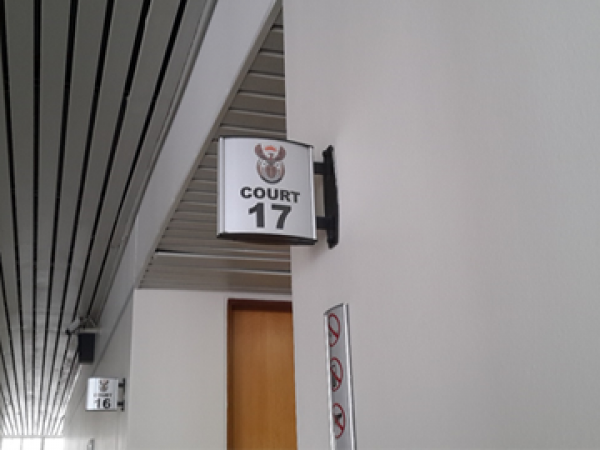Angy Peter trial: parties contest whether victim could have spoken before his death

Yesterday in the murder trial of Angy Peter, a medical expert for the state, Dr Estie Meyer, testified that she saw “no anatomical reason” why Rowan du Preez could not have spoken to the police after he was assaulted.
Peter and her co-accused, husband Isaac Mbadu, Azola Dayimani and Christopher Dina are being tried in the Cape High Court for the kidnapping and murder of du Preez. Du Preez died after being necklaced in October 2012. He suffered burns to his entire body and died in hospital roughly 20 hours after the incident. Police claim that du Preez named the accused as his assailants before he died.
Currently the court is hearing a “trial-within-a-trial” to determine Du Preez’s condition before his death and whether he could have named his assailants.
Meyer stated that anatomically three things are required for a person to speak.
First, the brain and central nervous system must be intact. She said that Du Preez’s autopsy revealed that there were no head or neck injuries that would have affected his ability to think or speak.
Second, the vocal cords must be functioning and intact. Du Preez’s vocal cords had two lacerations on them. Meyer said these may have been from shouting, or from medical procedures done in an attempt to save Du Preez’s life. She said that the two lacerations were not severe enough to stop Du Preez from talking.
Third, the tongue must be working. Du Preez’s tongue was slightly black, but not burnt or swollen. Meyer stated that Du Preez would have been able to use his tongue sufficiently to communicate and be understood.
Meyer stated that based on these three facts, there was no physical reason why the murder victim could not speak. She did say that she was not a burns specialist; she is an ear, nose and throat surgeon. She confined her statements to du Preez’s physical condition after the fatal assault and the effect that the burns may have had on his ability to speak.
The trial then focussed on Du Preez’s state of mind after the assault. This was based on the Glasgow Coma Score given to Du Preez by the police and ambulance staff on the scene. This is an assessment used on patients in emergency situations to determine their consciousness and lucidity. The score is out of 15. A score of 15 indicates that the patient was responsive, aware of his surroundings and spoke clearly and lucidly.
Du Preez was given 15 out of 15 by police officers on the scene. Du Preez was also given 15 out of 15 by Ms Peterse, the ambulance assistant, who was the first respondent on the scene. The attending paramedic, Dr Abdullah gave Du Preez a 15 as well. Meyer stated she would give Du Preez 14 out of 15.
Advocate William King, representing Peter, read testimony from Peterse in which she described that Dr Preez was unable to say anything except “water”. She also stated that they had to obtain his first name from the police officers. King pointed out that on her admission the address section was left blank because Peterse stated that she was unable to obtain that information from Du Preez.
King juxtaposed that testimony with that of the police officers on the scene, who explained that Du Preez stated clearly his full name and full address. The officers have claimed that Du Preez then also disclosed the identity of those who assaulted him.
King entered into evidence that 18 hours after the incident, Du Preez’s blood alcohol level was 0.3. The legal limit is 0.05, which therefore placed Du Preez well over the legal limit. King said this would have made him “smoor dronk” and therefore unable to speak clearly or lucidly.
After Meyer’s testimony finished the state rested its case for the “trial within a trial”.
Today a specialist in fire and rates of burning will testify on the burning tire placed around Du Preez’s neck. Tomorrow or Thursday a burns expert will testify for the defence, as to whether Du Preez would have been able to speak clearly and provide the information the state says he did.
Peter’s defence is that she is being set up by the police and that she is innocent. She was involved with the Social Justice Coalition’s campaign to setup the Khayelitsha Commission of Inquiry in policing.
Next: Capricorn violence: taxi drivers killing each other
Previous: “Now I can’t afford groceries” - grant recipient after illegal debt deductions

This article is licensed under a Creative Commons Attribution-NoDerivatives 4.0 International License.


